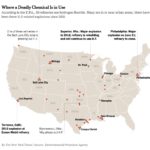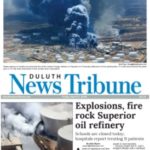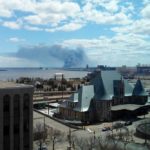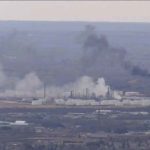Wondering why I didn’t panic
On the day of the Husky Energy oil refinery explosion, fire, ecological disaster in Superior, I didn’t panic. I didn’t even find out until nearly 5 p.m. And when I did, I turned on the TV and let the coverage flow as background noise.
Later, I talked to friends who were anywhere from anxious to panicked. I’ve been thinking about why my response was so different.
All this has happened before …
When my friends were disconcerted by the evacuation order, I pointed to the benzene spill of nearly thirty years ago. “We’ve done this before.”
In 1992, 14 cars of a freight train derailed on a bridge over the Nemadji River about five miles south of Superior. Roughly 80,000 people in the two states were forced to evacuate as 260 National Guard and Army Reserve troops were mobilized. [contemporary account here and here].
Accounts twenty years later revealed how toxic the whole event was — the death toll includes the fish, the environmental damage to the river. And it revealed how improvised the whole event was — the order to evacuate was improvised by police based on a sense that, if their families lived in the area, they would tell them to leave. Accounts twenty-five years later on this site [pdd] make the story even richer.
Like some twist on Peter Pan, I imagine: “All this has happened before. And it will all happen again. But this time it happened in Superior and Duluth.”
It happened in Superior
Unlike the benzene spill, the impacted area this time was just Superior. Duluth was the safe haven for my friends in Souptown. The bay, the winds, they protected me, and so maybe made the experience less real.
After the event, reflecting on both the benzene event and this one, I felt a twinge, like I am some Eloi living on an economy based in tourism, healthcare and education while my friends across the bay are some Morlockian community who work with toxic chemicals.
The dichotomy is false for a number of reasons. But I’m not here today to correct my sense of the balance of industrial employment in the Twin Ports by weighing paper mills against refineries. I’m just trying to parse why this disaster was close and yet I was entirely casual as I experienced it.
We know we have a refinery in our community
At the six o’clock newscast, one of the officials [I don’t remember which one because I was only half paying attention] said “We know we have a refinery in this community.”
Somehow, I laughed that the official had to say it — of course, in the 21st Century, we have contingency plans for 21st-Century disasters, at least the ones that might happen in our litigious society.
[Honestly, I think we outsource our manufacturing to other nations because corporations aren’t expected to take that care in other parts of the world. In the past, I have made my engineering students read about the Union Carbide disaster in Bhopal.]
I’m still wondering whether mine is misplaced faith.
Milwaukee Kid
The friends who loaded their cars and left town or who poured themselves cocktails to calm their nerves — they didn’t grow up walking along train tracks in an urban center. They didn’t live in an environment where green was decorative, in the yard-wide strip between the sidewalk and the road. A tree that grew too large was a nuisance because it displaced or cracked the concrete, making the big wheel bump as I rode over it. Concrete was the color of my childhood.
When you grow up in a world where grey is everywhere, where even the lake functioned mostly as a road for boats and, unfortunately, as a sewage system endpoint, maybe you look across the bay at a cloud of black and grey and don’t see disaster. You see the everyday, brought into view.
…
I didn’t panic because this explosion, fire, ecological disaster was just the everyday, brought into view. Maybe that unsettles me most.
Recommended Links:
Leave a Comment
Only registered members can post a comment , Login / Register Here














1 Comment
Helmut Flaag
about 7 years ago